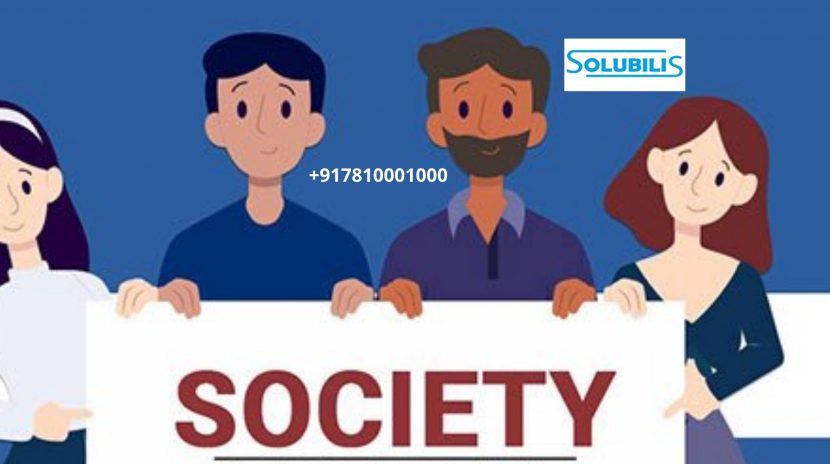A general public is an organization or a relationship of people (for the most part unincorporated) joined as one by shared agree to think, decide and act mutually for an equivalent normal reason that might be enlisted for altruistic purposes. Social orders are administered by the Societies Registration Act 1860, which has been embraced by different states. In this blog I have discussed whether the family members can also be members of the society.
The Societies Registration Act, 1860 administers social orders is an all-India Act, but many states have taken on variations on the Act. According to the Societies Registration Act, 1860, a general public can be framed by least (at least seven) people, any Indian resident, qualified to go into an agreement, can fill in as an individual from the overseeing advisory group or administering committee members of society, in spite of the fact that there is no restriction in the Societies Registration Act against non-regular legitimate people or outsiders serving in this limit.
The main benefit of framing a general public is that it gives a corporate appearance to the association members, and gives more prominent adaptability as it is simpler to correct the update and bye-laws of the general public that on account of a trust, terms of which are completely showed in the trust deed. Notwithstanding, the development of a general public requires more procedural customs than on account of a trust.
The Societies Registration Act, 1860, oversees social orders which is an all-India Act. The candidates should enlist the general public with the state Registrar of Societies having ward to be qualified to apply for charge excluded status.
A registration application incorporates the general public’s notice of affiliation and rules and guidelines. As a general rule, Indian residents fill in as individuals from the overseeing advisory group or administering gathering of social orders, in spite of the fact that there is no denial in the Societies Registration Act against non-regular legitimate members or outsiders serving in this limit.
Society pay is absolved from charge. For this, after enlistment, you wanted to obtain a declaration from the Income Tax Department. This testament is called 12A. Gifts to the general public are additionally absolved from charge (for example the benefactor won’t need to pay charge on the measure of gift). For this, you really wanted to get 80G testament from Income Tax Department.
Need for Society registration
The general public enlistment is expected to advance the expressive arts, science, writing, or information sharing for an intentional matter or for a noble cause. The enlistment should be possible for specific sort of social orders (members) and is grouped by the Society Act under section 20.
The general public enlistment should be possible for altruistic reasons like upkeep of military vagrants, shelters, support of libraries, exhibitions, gallery for public, and political training.
Procedure
The principal significant measures for registration is the base number of individuals which must be seven or it very well may be more than that. The Indian Societies Act make it simple for even organizations or unfamiliar nationals to frame a general public. The State government and its fitting specialists manage the enlistment of the social orders.
Remarkable name: The Indian Societies act make it obligatory to have an extraordinary name for enlisting the social orders. It is additionally significant that the name of the general public chose ought to be acknowledged by every one of the citizenry. The general public name must be exceptional in all sense and in any capacity establishes a connection of some other society or the name is as of now taken by some other society it makes the other society (earlier registration holder) to go against the more up to date enlistment.

The following standards make it compulsory for the social orders to have an update of affiliation. This likewise has one more state of making it compulsory for the social orders to outline rules and guidelines for the social orders. The social orders with their update, rules and guidelines must be marked and confirmed by each registered individual from the general public saw by the vow director, legal official, and top of the line judge.
The application form must be connected with the introductory letter mentioning the enlistment of the general public, copy of MOA, copy of rules and guidelines, Address evidence of the general public, a couple of moments of the gathering previously held, oath from the president and the secretary of the general public, a No complaint declaration (NOC).
The documents that should be appended to the general public registration are PAN card of the relative multitude of individuals from the general public, the home of verification which incorporate Aadhar card, service charge, driving permit, identification, bank proclamation. The update of affiliation (MOA) needs to incorporate the work and mission of the general public, the subtleties of the individuals and furthermore the location of the general public.
Can blood relatives form Society?
The Delhi High Court (“DHC”) has as of late held that the option to register a general public, as a lawful element, is accessible to any at least seven people meeting up, regardless of whether they are identified with one another by blood or not.
The Registrar of Societies, Government of NCT of Delhi (“Registrar”) has been, founded on the rules gave by the Government of NCT of Delhi, requiring all people burning of enlisting a general public with its workplaces, to present an oath affirming that the individuals from the general public are not related via blood or in any case.
The prerequisite for such an affirmation on oath came up for thought by the DHC as of late regarding Brij Mohan Gupta Vs. Recorder of Societies. For this situation, the Registrar had dropped enlistment of a general public on the ground that a wrong sworn statement, affirming nonappearance of any blood relationship among its individuals, was submitted with the Registrar at the hour of registration in spite of two of the general public’s advertiser individuals being father and child. The request for the Registrar dropping enlistment of the said society was tested before the DHC.
As far as the DHC judgment in the said case, there is no ban under the Societies Registration Act, 1860 that the people burning of framing a beneficent or some other society can’t be identified with one another by blood or in any case. The DHC additionally saw that such a necessity had no legal or level-headed premise and was plainly illicit as well as being in contradiction to Article 14 (Right to Equality) and Article 19(1)(c) (Freedom of Every Citizen of India to Form an Association or Union) of the Constitution of India.
Resultantly, the DHC put away the request for the Registrar dropping registration of the said society. Following the judgment, the people related by blood can get together to shape a general public in the NCT of Delhi.
